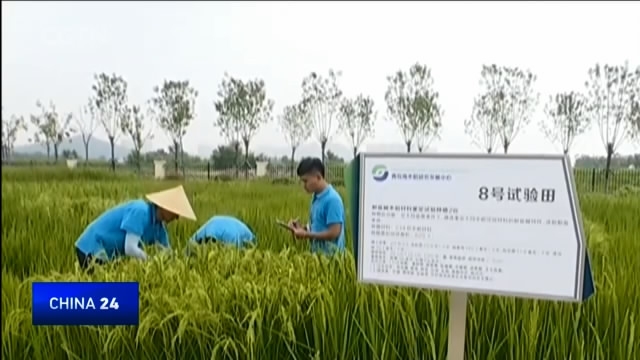
21:36, 09-Apr-2018
New & Improved: China plans large-scale planting of sea rice

This year, 176 fine varieties of sea rice will be planted in five major types of saline-alkaline land across China, a country, where over 60 percent of the population relies on rice as their staple food.
The nation is also home to one-tenth of the world's saline-alkaline land. And there are high expectations, converting saline-alkaline land into arable land to increase rice yields comes at a time when cultivated land resources are decreasing.
ZHANG GUODONG, DEPUTY DIRECTOR QINGDAO SEA RICE RESEARCH AND DEVELOPMENT CENTER "Through earlier stage market research, it's estimated that China has nearly 100 million hectares of saline-alkaline soil. Around 13 to 20 million hectares of such soil have the potential to be converted into arable land. This soil is mainly distributed in southwest China's Xinjiang, northeast regions as well as Yellow River delta regions."
According to the International Rice Research Institute, millions of hectares in humid regions of South and Southeast Asia are technically suited for rice production, but are left uncultivated or have very low yields because of salinity and problematic soil. Sea rice is resistant to pests, diseases, salt and alkali, and does not need fertilizer. Breeding varieties with in-built salt tolerance is considered the most promising, economical and socially acceptable approach. Currently, the most advanced sea rice breed in China has a yield of 6,000 kg per ha.
YUAN LONGPING, RENOWNED RICE SCIENTIST MEMBER, CHINESE ACADEMY OF ENGINEERING "If we expand the production of sea rice to 6.7 million ha with the minimum yield of 300 kilograms per unit of area, there will be an increasing production of 30 billion kilograms every year. That's able to feed 800 million more people, which is equal to the total annual grain output of Hunan Province."
Currently, China's sea rice varieties are still in the research and development stage. Chinese scientists are trying to cultivate more types of sea rice by superior gene hybridization. Natasha Hussain, CGTN.

SITEMAP
Copyright © 2018 CGTN. Beijing ICP prepared NO.16065310-3
Copyright © 2018 CGTN. Beijing ICP prepared NO.16065310-3